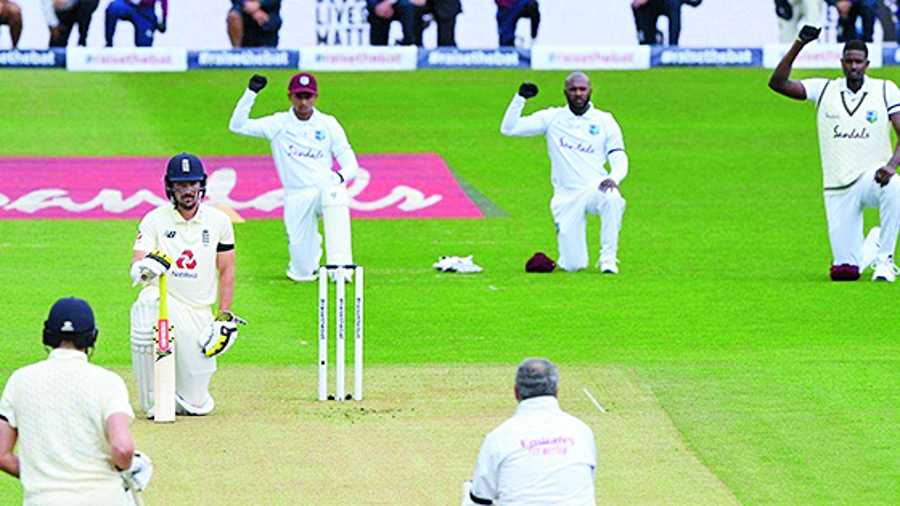Book: Why We Kneel, How We Rise
Author: Michael Holding,
Publisher: Simon & Schuster
Price: Rs 499
Be it on the field or during commentary, Michael Holding has always spoken his mind. His latest book, Why We Kneel, How We Rise, deals with something that is very close to his heart: racism. It is a no-holds-barred, straight-from-the-heart talk by the West Indies fast-bowling great. It begins on a damp evening in Southampton in July 2020, when Holding spoke about racism in the aftermath of George Floyd’s murder in the United States. He remembers how his mother’s family stopped talking to her since his father was too dark. His mother, who was considered relatively light-skinned, barely existed in her family since. Holding has revealed a family secret that had been swept under the carpet. But he wanted to move on and put it behind him. “I was looking up at those dark Southampton skies again, wiping my face, as the interview came to an end, thinking about my mom and dad who are no longer alive,” recalled Holding. He points to the fact that racism is not a white-only issue. Everybody is affected by its skewed rules and education system. In cricketing parlance, he “had bowled the ball and found the edge; it was up to others to now take the catch to complete the job”. Holding reveals he got a call from Thierry Henry the morning after and the French football star uttered only two words — “I understand.”
But the book is not just about negative and dark episodes; it is also about positivity and hope. Holding’s concern is not just about sport alone: his protest is against the savage treatment of black people and he aims to educate the masses. This book is “not in a way designed to make Whites feel guilty or ashamed, or for Blacks or people of colour to feel angry, but just to make you recognise that, for hundreds of years, people of colour have been treated like sub-humans. And now it’s time they got some equality.” It focuses on how we can fix the education system so that everybody, regardless of colour, benefits.
It traces the history of racism and tells the younger generation that this issue can no longer be ignored. The book goes back to his early days in Jamaica when he had no real understanding of racism at home during his growing-up years. It was only when he started travelling because of cricket that he came face-to-face with the real world. Holding talks about Marcus Garvey, Jamaica’s first national hero, who helped inspire America’s civil rights movement by arguing for black people’s economic independence and for African-Americans to show pride in their heritage.
Holding recounts several instances when he had been subjected to racial discrimination during his playing days. He goes on to narrate the ones that stick in memory. “They each have the same impact, they strip away your humanity, they take away your feelings of self-worth,” he recalls. More than three decades after his retirement, the fearsome fast bowler admits that he should have spoken up during his playing days. He realizes that he ought to have been more vociferous and pointed out the offender when he faced racial slurs from the crowd in Australia. He says he was “selfish” by not protesting then.
He cites the socio-economic problems that are the root cause of the persistent dehumanization of black people. The belief that those who consider themselves superior want blacks to be quiet and follow the path laid down by them. He cites the example of Colin Kaepernick, a quarterback for the San Francisco 49ers in America’s National Football League, who showed the guts to speak up against white privileges. He was responsible for the ‘taking a knee’ movement and raising awareness about Black Lives Matter. That the problem is far from over was vindicated by an ugly eruption of racist jibes against some of England’s young black players following their loss in the Euro football championship final.
Some parts of the book may be disturbing because of the heinous crimes that have been explicitly described, but as Holding says, “the desire to dominate, punish, exploit and dehumanise the Black man could not just be turned off like a tap.” From making black men slaves on plantations to ‘peonage’, the book highlights how a loophole in the 13th Amendment of the US Constitution allowed slavery to continue in a different way. It reflects in detail the history of the slave trade and how Africans were taken to the Caribbean and treated appallingly. Holding says there was little focus on the ills and the brutality of the slave trade and, if anything, there was a certain romanticization of it. The impact of Britain’s industrial revolution and the civil rights movement in the US on the black people have also been dealt with in detail.
Holding also writes of sporting legends like Usain Bolt, Naomi Osaka, Thierry Henry, Michael Johnson and Makhaya Ntini to highlight their insights on the issue. Bolt recounts how he was being followed when he went to buy a watch; the shopkeeper refused to show it to him since he thought that the black man didn’t have the money to buy it. The attitude changed once Bolt acquired fame and wealth.
It would have helped if the book contained pictures related to some of the incidents of hate against black people. Nevertheless, this is Holding’s endeavour to speak the truth as well as an attempt to bring about real change in society.











